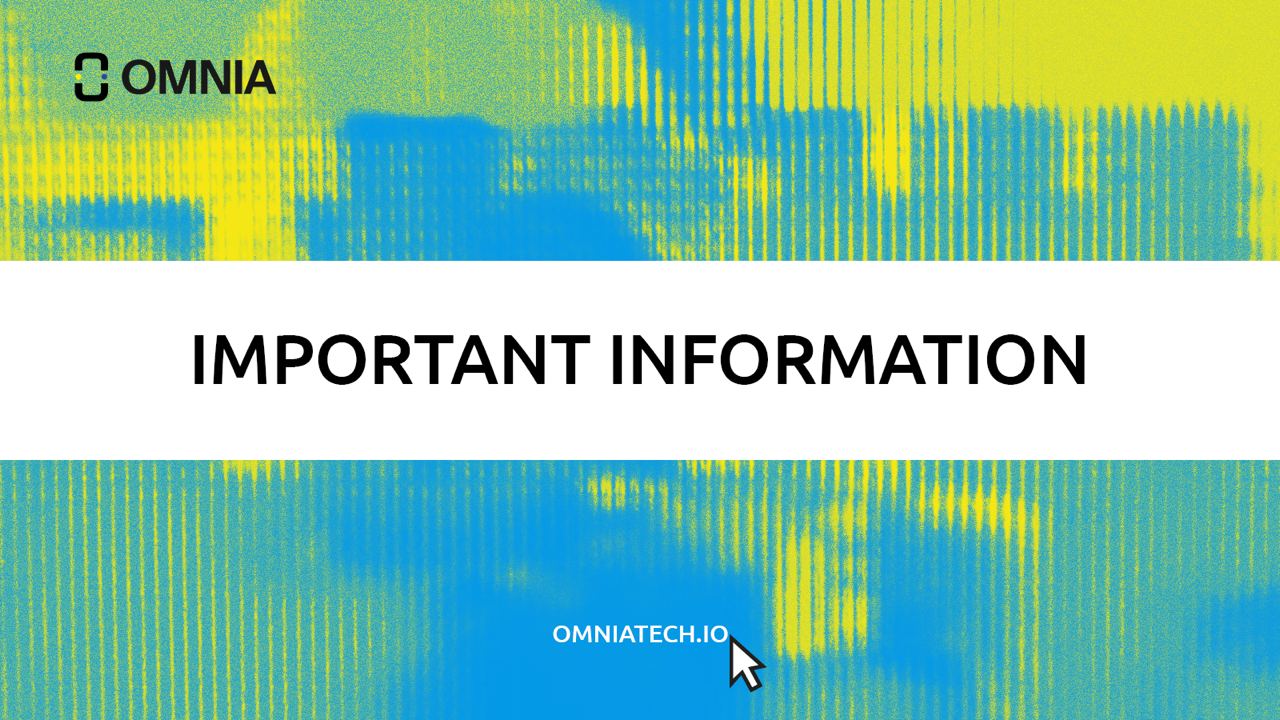
Blockchain Based Privacy Enhancing Technologies
As Web3 continues to evolve and develop, there is an urgent need to focus on privacy on the blockchain in a similar, if not a more advanced manner, than what is available for Web2. Web3 users want to control their privacy on the blockchain and choose when they reveal personal information, such as addresses, transaction amounts, and even IP addresses.
The OMNIA team has thus compiled the following resources that explain unfamiliar concepts such as confidential transactions, MimbleWimble, Ring signatures, Dandelion, bulletproofs, Mixers, zero-knowledge proofs, and secure multi-party computation.
Confidential Transactions
Confidential transactions (CT) on the blockchain is the idea of shielding transaction amounts that would otherwise be publicly available on the broader network. The sensitive information is only disclosed to the sender, receiver, and other parties selected to view it.
The idea was first discussed by Blockstream CEO Adam Back in 2014 and has since gathered traction in the Web3 space.
- BTCK 167 – Dr. Back on Confidential Transactions – Adam Beck discusses Confidential Transactions for Bitcoin in a 2017 episode of the Bitcoin Knowledge Podcast.
- An Introduction to Confidential Transactions – A simple explainer of Confidential Transactions by the Binance Team:
- Hidden in Plain Sight: Transacting Privately on a Blockchain – An explanation of privacy and confidential transactions on the Chain protocol by Oleg Andreev.
- Cypherpunks 101: ‘JoinMarket and Confidential Transactions’ with Adam Gibson: An Block Digest interview with Adam Gibson on why Confidential Transactions matter for Bitcoin and other digital assets.
MimbleWimble
MimbleWimble is a blockchain protocol derived from a spell in the Harry Porter series of books with a similar name, which ties people’s tongues in a knot, thus preventing them from revealing sensitive information.
The protocol uses Elliptic Curve Cryptography to verify transaction amounts without publicly revealing any information on the public network. It borrows a lot from Confidential transitions, whereby information is only disclosed to the sender and receiver of the transaction.
- Explaining MimbleWimble: The Privacy Upgrade to Litecoin – A deep dive into the implementation of MimbleWimble on Litecoin by the Elliptic team.
- The Impact of Litecoin’s MimbleWimble Privacy Upgrade – A general overview by the OMNIA team of how Litecoin’s MimbleWimble upgrade could benefit its users but cause delistings of LTC on exchanges.
- ELI5: MimbleWimble – A simple explanation of MimbleWimble and its benefits by James Webber.
- MimbleWimble explained like you’re 12 – Another simple explanation of how MimbleWimble works by Conor O’Higgins.
- A Short History of Mimblewimble: From Hogwarts to Mobile Wallets – A recap on the connection between Harry Porter and privacy on the blockchain by Beni Issembert.
Ring Signatures
Monero is one of the most popular privacy coins that utilizes ring signatures. This type of privacy-enhancing technology allows any member of a particular group, or ring of network participants, to validate a transaction by another entity in another group without revealing who approved it.
- Ring Signatures – A basic overview of Ring Signatures by the team at Monero.
- Monero: Ring Confidential Transactions – An animated introduction to Monero and ring signatures.
- Efficient Ring Signatures in the Standard Model – A lecture on a research paper written by Giulio Malavolta & Dominique Schröder discussing ring signature designs and implementations.
- Ring Signatures and Anonymisation – An explanation of Ring signature design and implementation on Monero by Professor Bill Buchanan OBE.
- Ring Signatures – Analysis and Implementation – by MIT Alumni, Andr´es F´abrega, Jonathan Esteban, Damian Barabonkov.
Dandelion
Dandelion is a protocol implementation at the base layer of a blockchain that introduces a new pattern for nodes to communicate. It goes a step further by frustrating efforts to trace the origin of transaction messages and IP addresses of nodes.
- What is The Dandelion Protocol? Complete Beginner’s Guide – by Blockonomi.
- Dandelions, and a Bright Future for Bitcoin Privacy – An explainer of Dandelion by Crytoconomy that explores its importance in scaling Bitcoin and increasing its privacy
- Introduction to Dandelion (BIP 156) with Giulia Fanti – A podcast by Zack Voell and Giulia Fanti, a computer scientist who introduced Dandelion in early 2017. It discusses the importance of anonymous peer-to-peer transactions and how they can improve Bitcoin.
- Building on Bitcoin – Dandelion – A presentation by Giulia Fanti on how Dandelion can improve the privacy of blockchain transactions, specifically on Bitcoin.
Zero-knowledge Proofs
In mathematics, Zero-knowledge proofs are ways of verifying the truth of a set of information without revealing the information itself. First introduced in 1985 by MIT scientists, Zero-Knowledge proofs have found real-life use cases in increasing privacy on the blockchain. ZCash is a popular privacy coin that utilizes Zero-knowledge proofs.
- The Knowledge Complexity of Interactive Proof Systems – The 1985 paper by MIT scientists introducing Zero-knowledge proofs.
- Zero-Knowledge Proof: How it Works, Use Cases & Applications – by AI Multiple.
- Zero-Knowledge Proofs – A simple explainer by the Binance team.
- What are Zero Knowledge Proofs – An introduction to Zero-knowledge proofs by the PIVX Class.
- Zero Knowledge Proofs – ZK-SNARKS ZenCash ZCash – A video explaining the basics of Zero-knowledge proofs and their implementation to increase privacy on the blockchain.
- What are zk-SNARKs? – An in-depth explanation of Zero-Knowledge proofs on ZCash by the ZCash team.
Bulletproofs
Bulletproofs are a type of short non-interactive zero-knowledge proofs that requires no trusted setup. They enable efficient, confidential transactions on blockchain networks such as Bitcoin.
- Bulletproofs: Short Proofs for Confidential Transactions and More – by Stanford University.
- Bulletproofs: Short Proofs for Confidential Transactions and More – A short presentation by Benedikt Bünz on how bulletproofs can enhance transaction privacy.
- Benedikt Bünz: Bulletproofs – A presentation by Benedikt Bünz on Bulletproofs when he was a Ph.D. student in the Applied Cryptography Group at Stanford.
- Monero Becomes Bulletproof – A look at how Bulletproofs can enhance Monero, by Lucas Nuzzi.
- Bitcoin Q&A: What are Bulletproofs? – Andreas Antonopoulos answers questions on what bulletproofs are and their relevance in privacy on the blockchain.
Secure Multi-party Computations
Secure multi-party computations is a cryptographic protocol that distributes computation across multiple parties without one individual party knowing what the other party is calculating. Although yet to become popular amongst crypto and blockchain projects, it could be an alternative way to increase users’ privacy.
- A beginner’s guide to Secure Multiparty Computation – A quick look at the function of secure multiparty computation by Keyless Technologies.
- Privacy-Preserving Solutions for Blockchain: Review and Challenges – by the Institute of Electrical and Electronics Engineers.
Secure Multiparty Computations on Bitcoin – A research paper by Alumni of the Univeristy of Warsaw (Poland) Marcin Andrychowicz, Stefan Dziembowski, Daniel Malinowski and Łukasz Mazurek.


